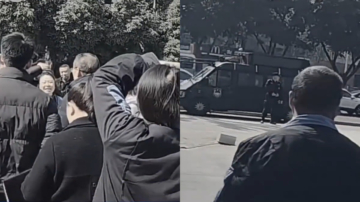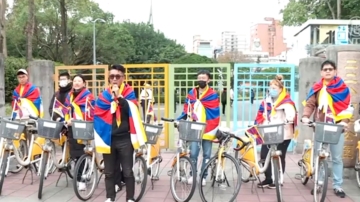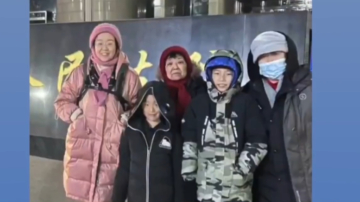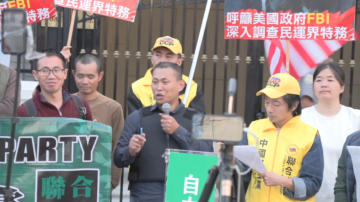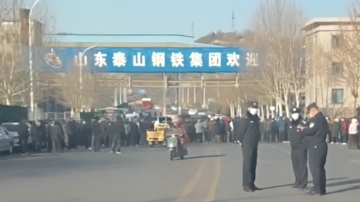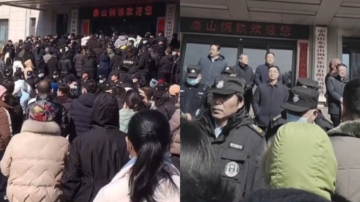【新唐人2013年05月17日讯】大陆一名安徽籍女大学生在南京应聘时,因户籍不是本地的而遭到拒绝,女大学生一怒之下将用人单位告上法庭,成为中国户籍就业歧视第一案。
据《自由亚洲电台》报导,就读法律专业的2013年应届女大学毕业生苏敏(化名),到南京市人力资源社会保障局应聘一个普通的话务员职位,却因为户籍是安徽省不是南京本地而遭到拒绝。苏敏在投诉无果的情况下,在5月13号委托律师将南京人力资源社会保障局以户籍就业歧视为由告上法庭,并要求被告赔礼道歉,并赔偿相关损失。
东莞打工者曹先生:“中国这个户籍是一大罪恶啊,它限制了公民非常多的基本权利,一个省到另外不同的一个省,你就好像二等公民一样,不能跟当地人享受平等的权利,你就业的话,你去找一些私营企业,一些单位还是可以的,你别想参加公务员啊,当地政府机关工作,政府机关工作人员都是本地人把控的,我们外地人根本不可能进去的。”
据了解,中国就业歧视五花八门,包括户籍、学历、学校、肤色、年龄、残障、婚姻状况、语言、财产等等就业歧视。但据某调研小组在北京市、河北省、河南省、浙江省、重庆市5省市调查结果表明,户籍就业歧视是最严重的就业歧视之一,不仅表现在一些企业招聘过程中,在事业单位和国家机关公务员招考和招聘中尤为如此。在遭遇过户籍歧视的青年中,有57.9%是农村户口,有78.9%是非本地户口﹔而在北京地区的调查中,非本地户口求职遭拒绝的比例,达到了惊人的93.9%。
原《河北人民广播电台》编辑朱欣欣:“因为中国真正的市场经济没有完全市场化,很多行业、领域都是被各地的地方保护啊,设置很多很多的限制。当地为了考虑到当地的一些社会、经济各方面,首先满足本地的劳动力、就业安排。它不愿意放开就在这儿,关键是有很多都是地方保护主义。都是各地分割自己的势力范围。”
大陆户籍歧视体现在就业上还只是冰山一角,在就学、买房、办理保险,甚至办理银行业务等方面都有严重的户籍歧视。
东莞打工者曹先生:“再一个,子女上学的问题,我们在这生活、工作十多年,还是二等公民,子女不能享受公办教育,只能享受民办教育,每年花要很多钱上学。外地工人子女上学,百分之八、九十都是上民校的。 ”
有学者指出,目前中国的户籍制度,比国民党甚至北洋军阀时期的户籍制度都要落后,而户籍歧视已经成为过街老鼠,众矢之的。
朱欣欣:“很严格的户籍制度是共产党执政以后进行的,它远远的不能满足现在人们这种要求,应当及早废止。一开始,中共建立户籍制度,一个是便于它对民众的统治,因为户籍制度严格限制人们自由的迁徙,也便于对人进行控制,户籍制度同时城乡二元的结构,造成了农民和城镇居民不同的待遇,现在户籍制度遭到大家的一致反对。”
对于南京户籍就业歧视案,深圳作家朱建国在接受《自由亚洲电台》采访时表示, 不管法院最终能否受理此案,在目前的中共体制下,户籍就业歧视问题是不可能解决的,即使最终胜诉也没有意义,因为这种案例,不会被当局允许推广。
采访/田净 编辑/张天宇 后制/李智远
China’s First Lawsuit on Hukou Discrimination in Employment
A female college graduate was turned down for a job offer
for not having a local Hukou (permanent resident status).
In a rage, she took legal action against the employer.
This has become the first case of Hukou discrimination
in employment in China.
Radio Free Asia has reported that a fresh college graduate
was rejected for a position by the Labor & Social Security Bureau in Nanjing.
The reason for the rejection was that she has no local Hukou.
The graduate filed complaints but has failed
to get any response from the bureau.
On May 1 3, her lawyer sued the labor administration
for its Hukou discrimination.
The lawsuit has demanded an apology and
compensation for losses.
(Migrant workers, Dongguan) Mr. Cao:
“The existence of the Hukou system is really very wrong.
It limits so many civil rights in China. Without local Hukou,
you lose the equal rights that local residents have.
In job hunting, some private employers may still
consider your job applications if you haven’t local Hukou.
But this is absolutely impossible for civil service positions.
Local state agencies are the turf of local people,
there’s no chance of acceptance for non-locals.”
It is known that there is a wide variety of
reasons for employment discrimination in China.
It involves aspects of Hukou status, academic degree,
race, age, handicaps, marital status, among others.
An official survey was conducted in five provinces,
in Beijing, Hebei, Henan, Zhejiang and Chongqing.
It showed that Hukou discrimination is one of
the most serious forms of discrimination in employment.
This is especially true in civil service recruitment.
Among those who suffer Hukou discrimination,
nearly 60% have been rural residents,
about 79% have been non-local residents.
In Beijing, the job rejection rate for those
non-local job seekers are as high as 93.9%.
(Former editor, Hebei state radio station) Zhu Xinxin says:
“China hasn’t developed any real market economy.
Many sectors are subject to local protectionism.
Local authorities only care about their performance appraisal.
They usually keep job positions for local residents,
instead of making them open to non-local citizens.
Local protectionism plays a key role in this issue.
Each region has its own divided power and influences.”
Hukou discrimination affects nearly every aspect of
people’s lives in China.
The impact on employment is only the tip of the iceberg.
It can affect people in their school education, buying homes,
in their eligibility for insurance benefits
and in their access to banking services.
(Migrant worker, Dongguan) Mr. Cao:
“Another issue is children’s school education.
We’ve lived and worked here for over a decade,
but have been treated like second-class citizens.
Our children are banned from attending state schools.
They have to seek education at private migrant schools,
which costs us so much each year.
Among the migrant workers’ children,
over 80% attend private migrant schools.”
Some scholars have said that China’s existing
household registration system is more backward than
the system in use during the reign of Kuomingtang
and during the Beiyang Warlord period.
Hukou discrimination has now become
a target of public criticism.
Zhu Xinxin: “The Hukou system started after
the Chinese Communist Party(CCP) took power.
It should be abolished for not fitting in with today’s society.
The CCP set it up to facilitate its control over the people.
The Hukou system strictly limits migration,
and divides the population into rural and urban residents.
It has been uniformly opposed by the public.”
The RFA report has quoted writer Zhu Jianguo.
He said that no matter whether the court accepts the lawsuit
or not, Hukou discrimination for employment has no solution.
Even winning the lawsuit is pointless,
as it won’t be recognized by the authorities.
据《自由亚洲电台》报导,就读法律专业的2013年应届女大学毕业生苏敏(化名),到南京市人力资源社会保障局应聘一个普通的话务员职位,却因为户籍是安徽省不是南京本地而遭到拒绝。苏敏在投诉无果的情况下,在5月13号委托律师将南京人力资源社会保障局以户籍就业歧视为由告上法庭,并要求被告赔礼道歉,并赔偿相关损失。
东莞打工者曹先生:“中国这个户籍是一大罪恶啊,它限制了公民非常多的基本权利,一个省到另外不同的一个省,你就好像二等公民一样,不能跟当地人享受平等的权利,你就业的话,你去找一些私营企业,一些单位还是可以的,你别想参加公务员啊,当地政府机关工作,政府机关工作人员都是本地人把控的,我们外地人根本不可能进去的。”
据了解,中国就业歧视五花八门,包括户籍、学历、学校、肤色、年龄、残障、婚姻状况、语言、财产等等就业歧视。但据某调研小组在北京市、河北省、河南省、浙江省、重庆市5省市调查结果表明,户籍就业歧视是最严重的就业歧视之一,不仅表现在一些企业招聘过程中,在事业单位和国家机关公务员招考和招聘中尤为如此。在遭遇过户籍歧视的青年中,有57.9%是农村户口,有78.9%是非本地户口﹔而在北京地区的调查中,非本地户口求职遭拒绝的比例,达到了惊人的93.9%。
原《河北人民广播电台》编辑朱欣欣:“因为中国真正的市场经济没有完全市场化,很多行业、领域都是被各地的地方保护啊,设置很多很多的限制。当地为了考虑到当地的一些社会、经济各方面,首先满足本地的劳动力、就业安排。它不愿意放开就在这儿,关键是有很多都是地方保护主义。都是各地分割自己的势力范围。”
大陆户籍歧视体现在就业上还只是冰山一角,在就学、买房、办理保险,甚至办理银行业务等方面都有严重的户籍歧视。
东莞打工者曹先生:“再一个,子女上学的问题,我们在这生活、工作十多年,还是二等公民,子女不能享受公办教育,只能享受民办教育,每年花要很多钱上学。外地工人子女上学,百分之八、九十都是上民校的。 ”
有学者指出,目前中国的户籍制度,比国民党甚至北洋军阀时期的户籍制度都要落后,而户籍歧视已经成为过街老鼠,众矢之的。
朱欣欣:“很严格的户籍制度是共产党执政以后进行的,它远远的不能满足现在人们这种要求,应当及早废止。一开始,中共建立户籍制度,一个是便于它对民众的统治,因为户籍制度严格限制人们自由的迁徙,也便于对人进行控制,户籍制度同时城乡二元的结构,造成了农民和城镇居民不同的待遇,现在户籍制度遭到大家的一致反对。”
对于南京户籍就业歧视案,深圳作家朱建国在接受《自由亚洲电台》采访时表示, 不管法院最终能否受理此案,在目前的中共体制下,户籍就业歧视问题是不可能解决的,即使最终胜诉也没有意义,因为这种案例,不会被当局允许推广。
采访/田净 编辑/张天宇 后制/李智远
China’s First Lawsuit on Hukou Discrimination in Employment
A female college graduate was turned down for a job offer
for not having a local Hukou (permanent resident status).
In a rage, she took legal action against the employer.
This has become the first case of Hukou discrimination
in employment in China.
Radio Free Asia has reported that a fresh college graduate
was rejected for a position by the Labor & Social Security Bureau in Nanjing.
The reason for the rejection was that she has no local Hukou.
The graduate filed complaints but has failed
to get any response from the bureau.
On May 1 3, her lawyer sued the labor administration
for its Hukou discrimination.
The lawsuit has demanded an apology and
compensation for losses.
(Migrant workers, Dongguan) Mr. Cao:
“The existence of the Hukou system is really very wrong.
It limits so many civil rights in China. Without local Hukou,
you lose the equal rights that local residents have.
In job hunting, some private employers may still
consider your job applications if you haven’t local Hukou.
But this is absolutely impossible for civil service positions.
Local state agencies are the turf of local people,
there’s no chance of acceptance for non-locals.”
It is known that there is a wide variety of
reasons for employment discrimination in China.
It involves aspects of Hukou status, academic degree,
race, age, handicaps, marital status, among others.
An official survey was conducted in five provinces,
in Beijing, Hebei, Henan, Zhejiang and Chongqing.
It showed that Hukou discrimination is one of
the most serious forms of discrimination in employment.
This is especially true in civil service recruitment.
Among those who suffer Hukou discrimination,
nearly 60% have been rural residents,
about 79% have been non-local residents.
In Beijing, the job rejection rate for those
non-local job seekers are as high as 93.9%.
(Former editor, Hebei state radio station) Zhu Xinxin says:
“China hasn’t developed any real market economy.
Many sectors are subject to local protectionism.
Local authorities only care about their performance appraisal.
They usually keep job positions for local residents,
instead of making them open to non-local citizens.
Local protectionism plays a key role in this issue.
Each region has its own divided power and influences.”
Hukou discrimination affects nearly every aspect of
people’s lives in China.
The impact on employment is only the tip of the iceberg.
It can affect people in their school education, buying homes,
in their eligibility for insurance benefits
and in their access to banking services.
(Migrant worker, Dongguan) Mr. Cao:
“Another issue is children’s school education.
We’ve lived and worked here for over a decade,
but have been treated like second-class citizens.
Our children are banned from attending state schools.
They have to seek education at private migrant schools,
which costs us so much each year.
Among the migrant workers’ children,
over 80% attend private migrant schools.”
Some scholars have said that China’s existing
household registration system is more backward than
the system in use during the reign of Kuomingtang
and during the Beiyang Warlord period.
Hukou discrimination has now become
a target of public criticism.
Zhu Xinxin: “The Hukou system started after
the Chinese Communist Party(CCP) took power.
It should be abolished for not fitting in with today’s society.
The CCP set it up to facilitate its control over the people.
The Hukou system strictly limits migration,
and divides the population into rural and urban residents.
It has been uniformly opposed by the public.”
The RFA report has quoted writer Zhu Jianguo.
He said that no matter whether the court accepts the lawsuit
or not, Hukou discrimination for employment has no solution.
Even winning the lawsuit is pointless,
as it won’t be recognized by the authorities.


